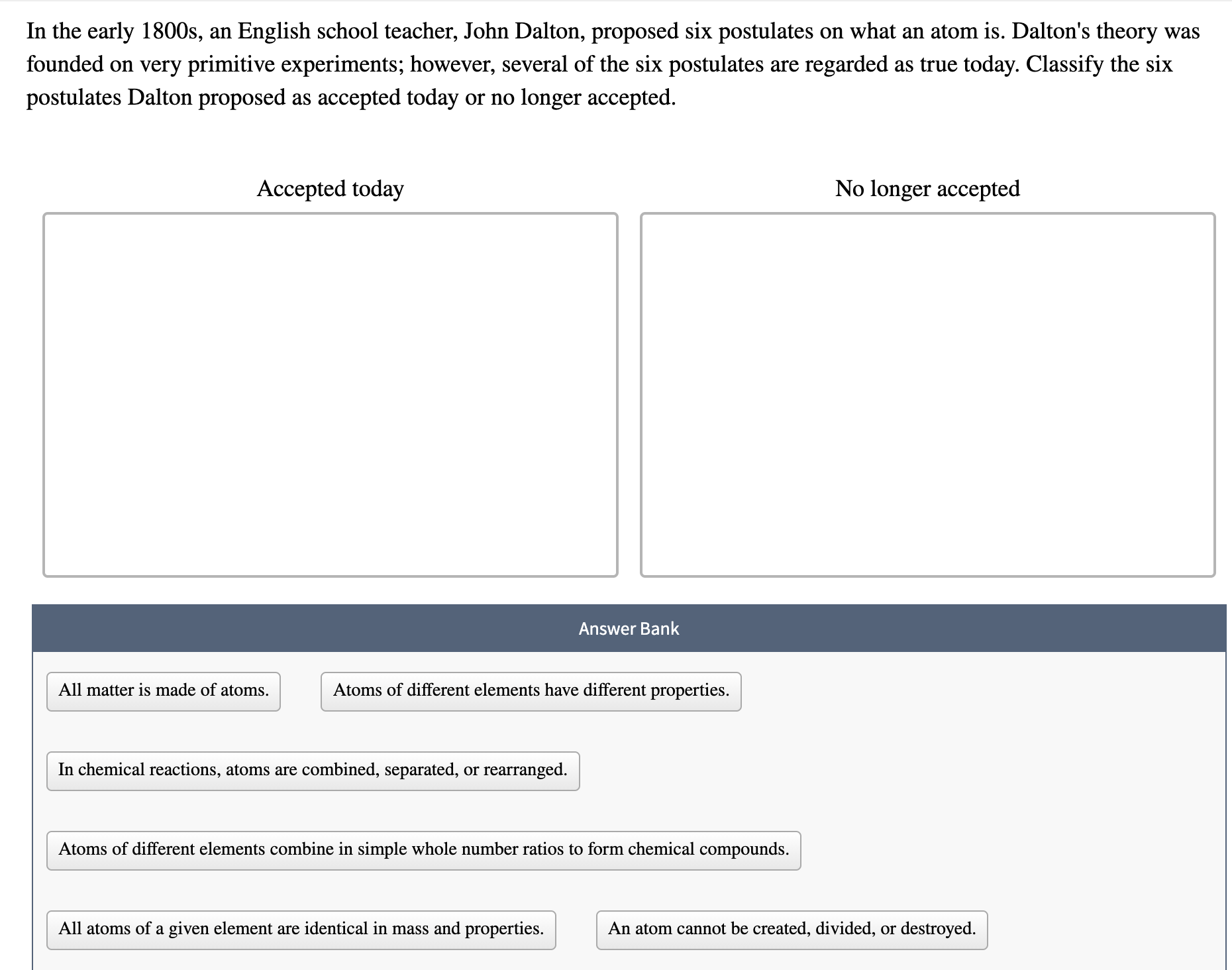In the early 1800s, an English school teacher, John Dalton, proposed six postulates on what an atom is. Dalton's theor founded on very primitive experiments; however, several of the six postulates are regarded as true today. Classify the postulates Dalton proposed as accepted today or no longer accepted. Accepted today No longer accepted Answer Bank All matter is made of atoms. Atoms of different elements have different properties. In chemical reactions, atoms are combined, separated, or rearranged. Atoms of different elements combine in simple whole number ratios to form chemical compounds. All atoms of a given element are identical in mass and properties. An atom cannot be created, divided, or destroyed.
In the early 1800s, an English school teacher, John Dalton, proposed six postulates on what an atom is. Dalton's theor founded on very primitive experiments; however, several of the six postulates are regarded as true today. Classify the postulates Dalton proposed as accepted today or no longer accepted. Accepted today No longer accepted Answer Bank All matter is made of atoms. Atoms of different elements have different properties. In chemical reactions, atoms are combined, separated, or rearranged. Atoms of different elements combine in simple whole number ratios to form chemical compounds. All atoms of a given element are identical in mass and properties. An atom cannot be created, divided, or destroyed.
Introductory Chemistry: An Active Learning Approach
6th Edition
ISBN:9781305079250
Author:Mark S. Cracolice, Ed Peters
Publisher:Mark S. Cracolice, Ed Peters
Chapter5: Atomic Theory : The Nuclear Model Of The Atom
Section: Chapter Questions
Problem 52E: Determine whether each statement that follows is true or false. a Dalton proposed that atoms of...
Related questions
Question
They're asking me to place the give word blank options in the right category. Can you help me by putting them in the right places?

Transcribed Image Text:In the early 1800s, an English school teacher, John Dalton, proposed six postulates on what an atom is. Dalton's theor
founded on very primitive experiments; however, several of the six postulates are regarded as true today. Classify the
postulates Dalton proposed as accepted today or no longer accepted.
Accepted today
No longer accepted
Answer Bank
All matter is made of atoms.
Atoms of different elements have different properties.
In chemical reactions, atoms are combined, separated, or rearranged.
Atoms of different elements combine in simple whole number ratios to form chemical compounds.
All atoms of a given element are identical in mass and properties.
An atom cannot be created, divided, or destroyed.
Expert Solution
This question has been solved!
Explore an expertly crafted, step-by-step solution for a thorough understanding of key concepts.
This is a popular solution!
Trending now
This is a popular solution!
Step by step
Solved in 2 steps with 1 images

Knowledge Booster
Learn more about
Need a deep-dive on the concept behind this application? Look no further. Learn more about this topic, chemistry and related others by exploring similar questions and additional content below.Recommended textbooks for you

Introductory Chemistry: An Active Learning Approa…
Chemistry
ISBN:
9781305079250
Author:
Mark S. Cracolice, Ed Peters
Publisher:
Cengage Learning


World of Chemistry, 3rd edition
Chemistry
ISBN:
9781133109655
Author:
Steven S. Zumdahl, Susan L. Zumdahl, Donald J. DeCoste
Publisher:
Brooks / Cole / Cengage Learning

Introductory Chemistry: An Active Learning Approa…
Chemistry
ISBN:
9781305079250
Author:
Mark S. Cracolice, Ed Peters
Publisher:
Cengage Learning


World of Chemistry, 3rd edition
Chemistry
ISBN:
9781133109655
Author:
Steven S. Zumdahl, Susan L. Zumdahl, Donald J. DeCoste
Publisher:
Brooks / Cole / Cengage Learning

Chemistry: The Molecular Science
Chemistry
ISBN:
9781285199047
Author:
John W. Moore, Conrad L. Stanitski
Publisher:
Cengage Learning

Chemistry & Chemical Reactivity
Chemistry
ISBN:
9781337399074
Author:
John C. Kotz, Paul M. Treichel, John Townsend, David Treichel
Publisher:
Cengage Learning

Chemistry & Chemical Reactivity
Chemistry
ISBN:
9781133949640
Author:
John C. Kotz, Paul M. Treichel, John Townsend, David Treichel
Publisher:
Cengage Learning